STATEHOUSE REPORT | ISSUE 21.31 | AUG. 5, 2022
BIG STORY: Teachers paid more, but shortages impact new year
NEWS BRIEFS: Cunningham picks Casey as running mate
LOWCOUNTRY, Ariail: Government censorship
COMMENTARY, Brack: Make mental health in schools a bigger priority
SPOTLIGHT: Palmetto Care Connections
MY TURN, Knapp: Big Oil is still laughing … all the way to the bank
FEEDBACK: Eliminate straight-party voting, more
MYSTERY PHOTO: Outreached arms
Teachers paid more, but shortages impact new year
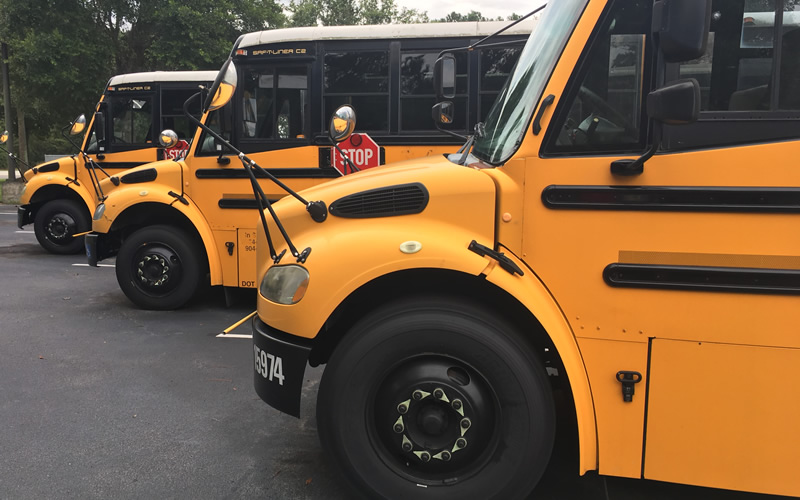
By Andy Brack | Elementary and secondary students heading back to public school classrooms this month face opportunities and challenges brought on by new funding and a blend of pressures faced by teachers.
For the new school year, the legislature boosted teacher salary schedules by $4,000 each. The minimum salary now is $40,000.
“Recent changes, such as potential pay increases for teachers, staff and retirees, have caused optimism in our ranks,” said Adrian King, a retired Army officer who teaches at Turning Point Academy in North Charleston.
 Katrina Goggins, chief communications officer for the S.C. Department of Education (SCDE), said educators are celebrating the boost in teacher salaries, although more needs to be done.
Katrina Goggins, chief communications officer for the S.C. Department of Education (SCDE), said educators are celebrating the boost in teacher salaries, although more needs to be done.
“As an agency, the SCDE and its partners continue efforts to recruit and retain teachers, bus drivers and other staff to address shortages and continue to implement programs and initiatives that will advance public education in our state.”
Some 90 percent of South Carolina’s 850,000 elementary and secondary students attend public schools. At the end of the school year in June, 772,292 students attended public schools. Enrollment for the new year won’t be available until 45 days after its start.
Last September, public schools employed almost 47,000 teachers, Goggins said. A February report showed 1,121 vacancies, a number that is thought to have grown after school let out in the spring.
For example in Charleston County when school ended in early June, 467 teachers resigned, which was about 15 percent of the district’s teachers, according to Charleston County School District spokesman Andrew Pruitt. As of Tuesday, the district has hired 530 new teachers for the 2022-23 school year and had 59 positions to fill.
Teachers are a little anxious
Teachers are also a little skittish about the coming year, said King, who is president of the Charleston County Education Association.
“The possible trifecta of teacher shortages, Covid resurgence and the economy makes many a little anxious,” King said. “First-year teachers without saved sick time to use for possible Covid quarantine may be the most affected.”

Sherry East, president of The South Carolina Education Association, said teacher shortages will impact the opening of schools this year. Some districts reportedly have up to 100 positions open, she said.
“We do not have a shortage of students,” she said, emphasizing that when schools don’t have enough teachers, students end up with larger class sizes.
She said that means “more work, more stress and less time [for teachers] to get to know and build relationships. This can lead to more discipline issues.
“Teachers [also] are finding out at the last minute that they have been transferred to another school, classroom or teaching a new subject for the first time two days before school starts and this is not creating a smooth back-to-school experience for students or staff.”
Kathleen Low, a science teacher at Hanahan High School, said burnout for teachers is a real issue.
“If class sizes get bigger or teachers need to cover classes due to unavailable subs or any number of other duties that have been attached to the work day, then this takes the time that teachers need to administer their own classes and extends the workday or week well beyond what they agreed to in their contract,” said Low, president of the Berkeley County Education Association. “More importantly, if teachers aren’t given the time needed to plan lessons that reflect the needs of the students in real-time, then that lesson doesn’t get to be as impactful as it could have been. And then that teachable moment is lost. This is real anxiety for teachers.”

Former state Superintendent of Education Jim Rex said the state’s teacher crisis reflects a national problem where fewer people are entering the teaching procession. One reason, he said, are the “non-academic needs” that students have now, such as the need to address increased mental health issues.
“Teachers are so ill-equipped to deal with these mental health issues students are bringing to the classroom,” he said. “Our kids are struggling. Our parents are struggling, Our teachers are struggling.”
- Have a comment? Send to: feedback@statehousereport.com
Cunningham picks Casey as running mate
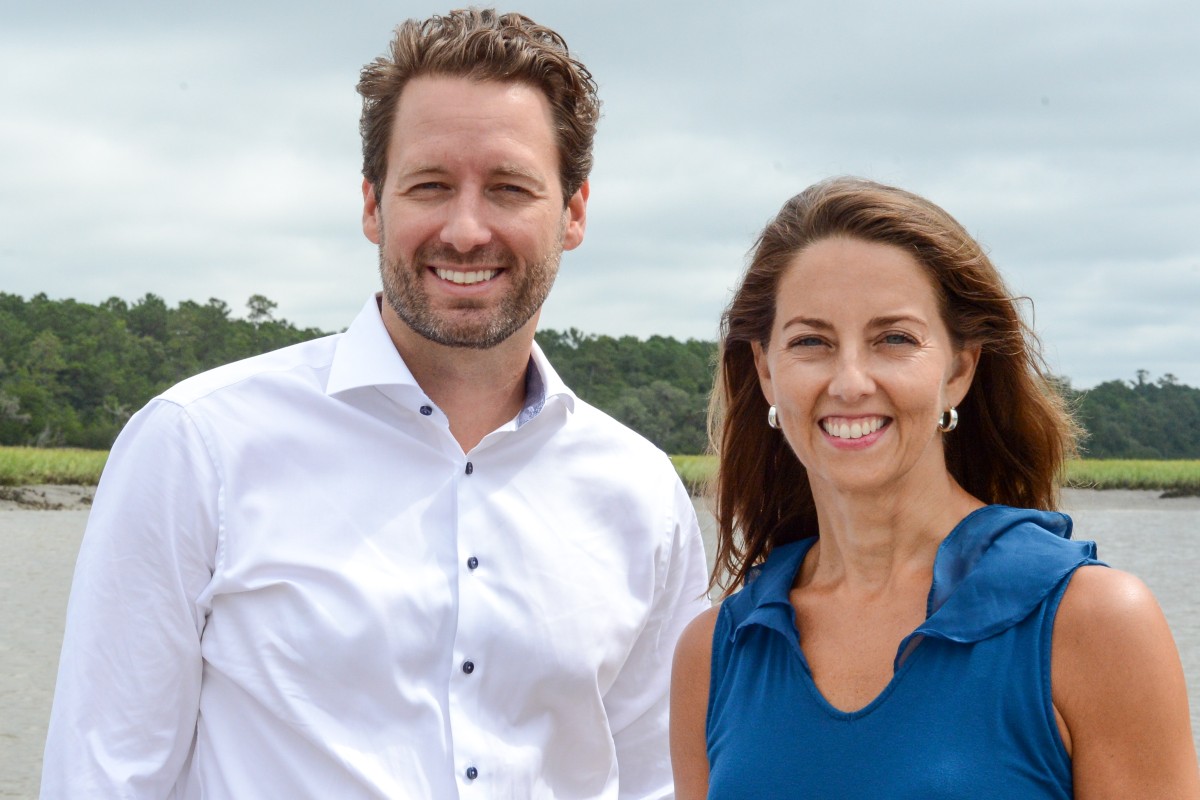
Staff reports | Former Congressman Joe Cunningham of Charleston, the Democratic nominee for governor, on Monday tapped a female civil litigator who flew combat missions in Iraq to be his lieutenant governor running mate.
“It is an incredible honor and privilege to be selected to be Joe Cunningham’s running mate,” attorney Tally Parham Casey said in a press release. “I have long admired Joe’s bipartisan approach to governing and believe he is exactly what South Carolina needs as governor.”
Cunningham told the Associated Press this week that Casey’s military service and legal savvy were among the qualities that would make her the right fit for the job. Casey, the state’s first female fighter pilot, served three combat tours in Iraq and has been a civil litigator for more than two decades.
“Tally Casey represents the very best of South Carolina,” said Cunningham in a press release. “As the first female fighter pilot in the South Carolina Air National Guard with three tours of duty over Iraq, Tally is a trailblazer who has courageously fought for our freedoms abroad. Now I have asked her to help me fight for our freedoms here at home.”
In other headlines:
![]() Slow start to hurricane season, but more activity ahead. While hurricane season is off to a slower than usual start this year, things might change in the coming weeks as the peak of the season has started. Officials with the National Oceanic and Atmospheric Administration are expecting more tropical cyclone activity now that August is here. Some 90% of hurricanes and strong storms occur between now and October. The agency predicts 14 to 20 named storms this year, including six to 10 that will become hurricanes, according to an undated forecast.
Slow start to hurricane season, but more activity ahead. While hurricane season is off to a slower than usual start this year, things might change in the coming weeks as the peak of the season has started. Officials with the National Oceanic and Atmospheric Administration are expecting more tropical cyclone activity now that August is here. Some 90% of hurricanes and strong storms occur between now and October. The agency predicts 14 to 20 named storms this year, including six to 10 that will become hurricanes, according to an undated forecast.
Lawyers deliver closing arguments in death penalty case. A South Carolina judge is expected to weigh in on the South Carolina’s death penalty as attorneys delivered their closing arguments. The lawsuit calls for S.C.’s two methods of execution — electric chair and firing squad — as unconstitutional for lack of evidence as a painless and effective form of execution.
Kansas voters reject amendment banning abortion. In a Tuesday vote with national implications, voters in conservative Kansas overwhelmingly rejected a proposed constitutional amendment that called for no right to abortion in the state. While there is still limited access to abortion in the state, the 59-41 vote is seen as illustrative of a majority coalition of voters who view abortion differently than the U.S. Supreme Court, which struck down constitutional abortion protection in June.
Leventis files for Sumter school board. Former Democratic S.C. Sen. Phil Leventis of Sumter has filed to run for a seat on his county’s school board. Leventis, who served eight terms in the state Senate, told the Sumter Item, “There is nothing that ought to be a higher priority for Sumter City Council, Sumter County Council and the delegation than the schools because so many people make their decision about moving to Sumter based on the schools. So, we have got to restore confidence and stability in the schools.”
Conroy keeps on teaching. This City Paper exclusive looks at how the late South Carolina author Pat Conroy is still teaching lessons six years after his death. He is the first White man to be buried in the St. Helena Memorial Gardens, a Black cemetery. Frequent visitors leave pens and other memorabilia at his headstone to show the inspiration and impact he had on others. Colleagues reminisce about Conroy and the impact on their own lives and they share Conroy’s story to others.
U.S. Senate passes toxic exposure bill impacting veterans. After a long fight over a package of legislation to cover impacts of toxic exposure from burn pits and other chemicals to military veterans while they were serving, the U.S. Senate passed bipartisan legislation by an 86-11 vote. Last week, more than two dozen Republicans stalled the bill. The measure, which now heads to President Biden, includes language to help thousands of Marines exposed to toxic water at Camp Lejeune in North Carolina.
Government censorship
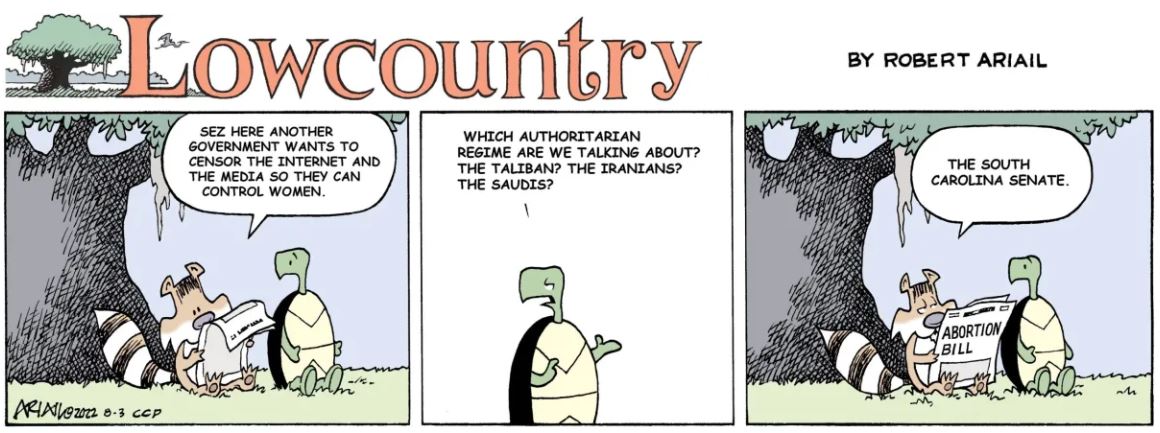
Cartoonist Robert Ariail often interprets things a little differently, but always has an interesting take on what’s going on in South Carolina. Love the cartoon? Hate it? What do you think: feedback@statehousereport.com.
Make mental health in schools a bigger priority
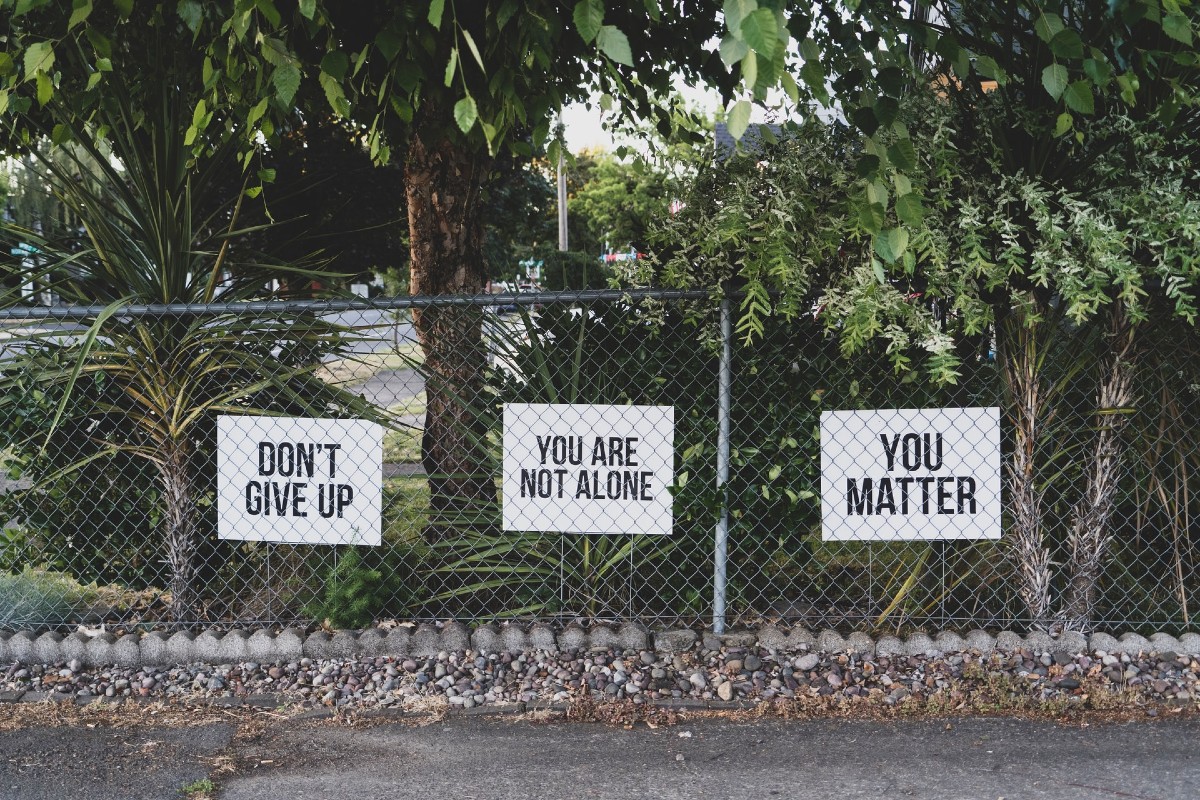
By Andy Brack | With school ramping up again, educators and policymakers need to keep a careful eye out for the mental health of our students. Since the pandemic, things haven’t been going well for many of them.
 “We have a mental health crisis in this country, especially among children and adolescents,” former state Superintendent of Education Jim Rex of Fairfield County tells us. “There’s been a three-fold increase among suicides and suicide attempts in the last four years.”
“We have a mental health crisis in this country, especially among children and adolescents,” former state Superintendent of Education Jim Rex of Fairfield County tells us. “There’s been a three-fold increase among suicides and suicide attempts in the last four years.”
Furthermore amidst Covid-generated isolation, distancing, virtual schooling and too much social media, there are more cases of depression, anxiety and eating disorders, Rex said.
According to a 2021 study by the Centers for Disease Control and Prevention, 37 percent of high school students reported their mental health has not been good most or all of the time during the pandemic.
“About three-in-10 high school students (31%) said they experienced poor mental health most or all of the time in the 30 days before the survey,” noted the Pew Research Center. “In addition, 44% said that, in the previous 12 months, they felt sad or hopeless almost every day for at least two weeks in a row such that they stopped doing some usual activities.”
Higher rates of mental health challenges are reported among students who are gay, lesbian or bisexual. For example, more than half of these students said they experienced poor mental health most of the time in the 30 days before the survey and three in four reported they felt sad or hopeless almost daily.
Gov. Henry McMaster rightly recognized the youth mental health crisis earlier this year in his State of the State address.
“This crisis is here, right now,” he said. “Students must have access to professional mental health counseling and services. Because 60 percent of South Carolina children are served by Medicaid, I have directed Health and Human Services Director Robbie Kerr to initiate an immediate review of our state’s behavioral health funding and delivery system. Time is of the essence. We must do better. The cost of doing nothing is unimaginable. And the damage, well, the damage will likely be immeasurable.”
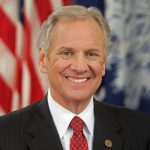
But McMaster also suggested a review of state-run treatment programs including privatization of behavioral services offered by the state. That, we worry, would be a disaster. More than a generation ago, states de-institutionalized many facilities, sending the mentally ill to communities for care. Unfortunately, they didn’t spend the dollars for community treatment needed to successfully reintegrate patients with mental health issues into the community.
A smarter idea, perhaps, is to invest more resources at South Carolina’s schools to give more training to teachers – but also have more mental health counselors available. In days when lawmakers rush to put more cops in schools, it makes more sense to take those resources and divert them into counseling services to identify at-risk kids and help them before something goes wrong.
There are some hopeful signs on the horizon. As students return, school-issued identification cards from middle school through college are required to have the National Suicide Prevention Lifeline printed on them to share a resource with students.
More importantly, a new 988 suicide prevention hotline went into effect last month. But the hotline, based in the office of the nonprofit Mental Health America of Greenville, doesn’t have sustainable funding, according to one report. It needs more funding to keep up a doubled increase in calls since the hotline opened July 16.
Of the state’s $1.3 million budgeted in state aid for the hotline, some $700,000 over two years will support the existing Greenville call center and another $480,000 is supposed to go to a second call center in Charleston.
“It’s not a great day in South Carolina,” Charleston Democratic Rep. Wendell Gilliard said in a recent interview. “Bottom line: We screwed up. Mental illness should always be priority number one.”
Andy Brack is editor and publisher of Statehouse Report and the Charleston City Paper. Have a comment? Send to: feedback@statehousereport.com.
Palmetto Care Connections
 Statehouse Report is brought to you at no cost thanks to the generous support of underwriters, such as Palmetto Care Connections. Established in 2010, Palmetto Care Connections (PCC) is a non-profit organization that brings technology, broadband and telehealth solutions to health care providers in rural and underserved areas in South Carolina. PCC hosts the Annual Telehealth Summit of South Carolina presenting state and national best practices and trends, as well as providing networking connections for health care, technology and broadband professionals.
Statehouse Report is brought to you at no cost thanks to the generous support of underwriters, such as Palmetto Care Connections. Established in 2010, Palmetto Care Connections (PCC) is a non-profit organization that brings technology, broadband and telehealth solutions to health care providers in rural and underserved areas in South Carolina. PCC hosts the Annual Telehealth Summit of South Carolina presenting state and national best practices and trends, as well as providing networking connections for health care, technology and broadband professionals.
The leader of the South Carolina broadband consortium, PCC assists health care providers in receiving broadband savings through the Federal Communication Commission’s Healthcare Connect Fund program. Since 2013, PCC has helped providers save more than $25 million in broadband costs.
PCC co-chairs the South Carolina Telehealth Alliance, along with the Medical University of South Carolina, serving as an advocate for rural providers and partnering with organizations to improve health care access and delivery for all South Carolinians.
- Learn more about Palmetto Care Connections.
Big Oil is still laughing … all the way to the bank

By Frank Knapp | In June, I had an opinion piece in the Charleston City Paper on high gas prices: “Blame Big Oil, now laughing all the way to the bank.”

In that piece, I pointed out all of the misplaced blame for the record gas prices.
The public was being told that President Joe Biden and the majority party in Congress were to blame. Politicians were pointing the finger at past energy policies saying that we needed to drill for more oil and build oil pipelines faster.
Of course, those proposed policies, if enacted today, would not add one drop of oil for years. This was all politics and no real solution to gas prices today.
There were real reasons, I suggested, for the cost of gas at the pump. Our boycott of Russian oil that has bipartisan support. Refinery capacity was down due to issues unrelated to government policy. And consumer demand for gas was up. Washington wasn’t to blame for that either.
However, what was a more important reason for the situation was the role of oil companies in setting gas prices. This was being completely ignored by the media and many politicians.
One only needed to look at Big Oil’s first quarter profits this year to see why the industry was largely culpable for high gas prices. I wrote:
“Oil industry profits were up nearly 300% in the first quarter of this year compared to the same period last year! We are talking about profit after taking into consideration their expenses and write downs due to exiting their business in Russia.”
Did these obscene profits lead to ramping up of production, as President Biden requested, or the oil companies simply lower their profit by charging less for their gas, which would have immediately helped the consumer?
Big Oil did neither.
Which brings us to oil company profits in the second quarter this year.
They were again record-breaking. Profits were up 235% from the same time last year for all the major oil companies: Chevron, Equinor, ExxonMobil, Hess Corp, Phillips 66, Shell and TechnipFMC.
The April-June profits are huge: $17.9 BILLION for ExxonMobil and $11.6 BILLION for Chevron.
And again, Big Oil did nothing to help consumers.
Instead, they did what all big corporations always do with windfalls from profits or the federal government cutting their taxes, like the 40% rate cut in December 2017. They buy back their own stocks to drive up the price of each share thus increasing the wealth of their shareholders and corporate execs.
“While you were feeling pain at the pump, Shell, Exxon and Chevron raked in $46 billion in profits over the last three months and said they would spend up to $47 billion on stock buybacks after spending $18.8 billion so far this year,” said Public Citizen.
Yes, gas prices have now come down a good deal, even though we still do not buy Russian oil, refineries still are not running at full capacity and consumer demand is still high.
What then is the reason for the gas price decline?
Bad publicity.
Big corporations hate bad press. So, they voluntarily make slight changes to reduce the political and public pressure.
We’ll have to wait for the third quarter financial reports to come out to see how the drop in the price of gas is impacting Big Oil’s profits.
But right now, the oil companies are still laughing all the way to the bank.
Frank Knapp of Columbia is president and CEO of the S.C. Small Business Chamber of Commerce. Have a comment? Send to: feedback@statehousereport.com.
Eliminate straight-party voting
To the editor:
![]() I made a proposal to S.C. Sen. Thomas Alexander, R-Oconee, to eliminate the straight party option on state ballots. Justifications are numerous: voters should at least see who they are voting for with the option to check one party if they wish — but see each name, and more importantly, they have no voice in any non-partisan races (school board, judges, council, etc.). It would require a bit more thought than a reflexive response. More voices for this idea could help.
I made a proposal to S.C. Sen. Thomas Alexander, R-Oconee, to eliminate the straight party option on state ballots. Justifications are numerous: voters should at least see who they are voting for with the option to check one party if they wish — but see each name, and more importantly, they have no voice in any non-partisan races (school board, judges, council, etc.). It would require a bit more thought than a reflexive response. More voices for this idea could help.
Secondly, and just for fun, a friend from Nebraska, Dorothy Ramsey, wrote a book “Milly for Mayor” in which a small midwestern town succeeded in a write-in campaign for a donkey. The message (my interpretation) is everyone benefits when the town (or state) actually gets involved with their own governance. I suspect you would enjoy the book.
– Kenneth S. Marsh, Clemson
Laughing
To the editor:
I can’t stop laughing at how incredibly ridiculous this publication is! At first I thought you were a knockoff of The Onion! You folks live in an alternative universe and it’s not reality.
– Tim Collie, Rock Hill
Send us your comments
Have a comment? Send your letters or comments to: feedback@statehousereport.com. Make sure to provide your contact details (name, hometown and phone number for verification. Letters are limited to 150 words.
Outreached arms
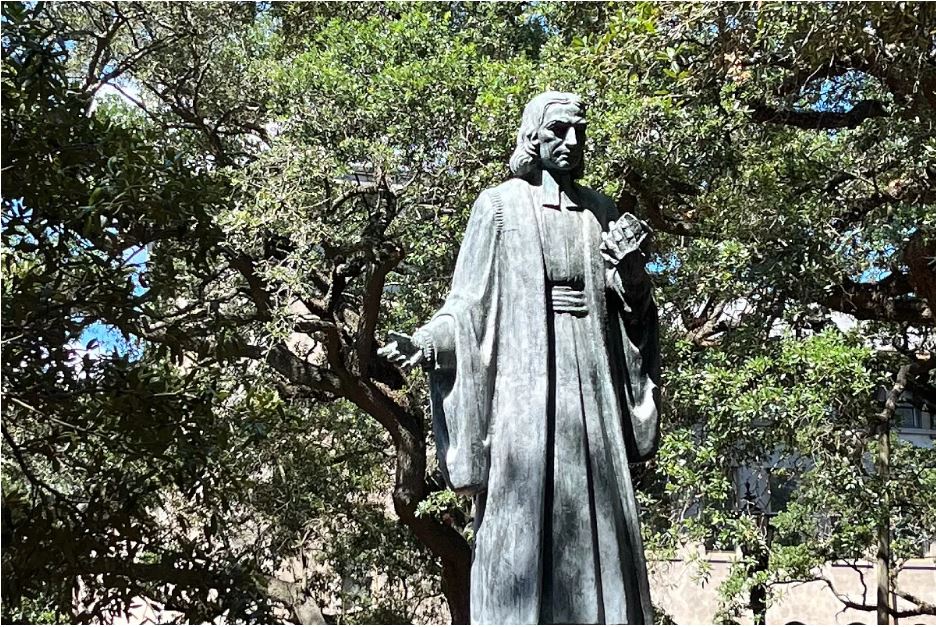
This week’s mystery is not from South Carolina, but you can assume it is somewhere near South Carolina. Who is this stern-looking figure and where is the statue? Send your guess — including your name and hometown — to feedback@statehousereport.com.
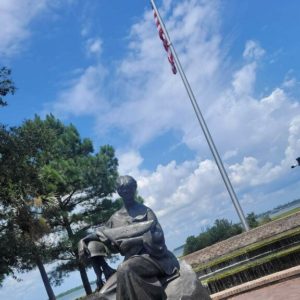 Last week’s photo of a statue of a grieving woman was part of a war memorial in Mount Pleasant that was submitted by Jay Altman of Columbia. Congratulations to the many readers who identified it: Barry Wingard of Florence; Allan Peel of San Antonio, Texas; George Graf of Palmyra, Va.; Arlene Traxler of Edgefield; David Lupo of Mount Pleasant; Steve Willis of Lancaster; Frank Bouknight of Summerville; Elizabeth Jones of Columbia; Curtis Joyner of Charleston; and Pat Keadle of Wagener;
Last week’s photo of a statue of a grieving woman was part of a war memorial in Mount Pleasant that was submitted by Jay Altman of Columbia. Congratulations to the many readers who identified it: Barry Wingard of Florence; Allan Peel of San Antonio, Texas; George Graf of Palmyra, Va.; Arlene Traxler of Edgefield; David Lupo of Mount Pleasant; Steve Willis of Lancaster; Frank Bouknight of Summerville; Elizabeth Jones of Columbia; Curtis Joyner of Charleston; and Pat Keadle of Wagener;
Peel shared more info: “Today’s mystery photo is of an 8-foot bronze statue of a grieving woman holding a folded American flag in one arm and resting her other arm on a combat helmet and rifle. Words on the ground under the statue read ‘On behalf of a Grateful Nation.” The statue was created by Raymond Kaskey (1943-present), a renowned American sculptor who is best known for creating the National WWII Memorial in Washington D.C. The statue is the centerpiece of the Memorial Waterfront Park just under the east-end of the Ravenel Bridge in Mount Pleasant. The park is dedicated to fallen veterans from all branches of the military, and includes two brick walls with the names of 74 men from Mount Pleasant who have died in wars.
>> Send us a mystery picture. If you have a photo that you believe will stump readers, send it along (but make sure to tell us what it is because it may stump us too!) Send to: feedback@statehousereport.com and mark it as a photo submission. Thanks.
- ORDER NOW: Copies are in Lowcountry-area bookstores now, but if you can’t swing by, you can order a copy online today.
- Now available as an e-book!
ABOUT STATEHOUSE REPORT
Statehouse Report, founded in 2001 as a weekly legislative forecast that informs readers about what is going to happen in South Carolina politics and policy, is provided to you at no charge every Friday.
- Editor and publisher: Andy Brack, 843.670.3996
Donate today
We’re proud to offer Statehouse Report for free. For more than a dozen years, we’ve been the go-to place for insightful independent policy and political news and views in the Palmetto State. And we love it as much as you do.
But now, we can use your help. If you’ve been thinking of contributing to Statehouse Report over the years, now would be a great time to contribute as we deal with the crisis. In advance, thank you.
Buy the book
Now you can get a copy of editor and publisher Andy Brack’s We Can Do Better, South Carolina! ($14.99) as a paperback or as a Kindle book ($7.99). . The book of essays offers incisive commentaries by editor and publisher Andy Brack on the American South, the common good, vexing problems for the Palmetto State and interesting South Carolina leaders.
More
- Mailing address: Send inquiries by mail to: P.O. Box 21942, Charleston, SC 29413
- Subscriptions are free: Click to subscribe.
- We hope you’ll keep receiving the great news and information from Statehouse Report, but if you need to unsubscribe, go to the bottom of the weekly email issue and follow the instructions.
- Read our sister publication: Charleston City Paper (every Wednesday in print; Every day online)
- © 2022, Statehouse Report, a publication of City Paper Publishing, LLC. All rights reserved.















 We Can Do Better, South Carolina!
We Can Do Better, South Carolina!